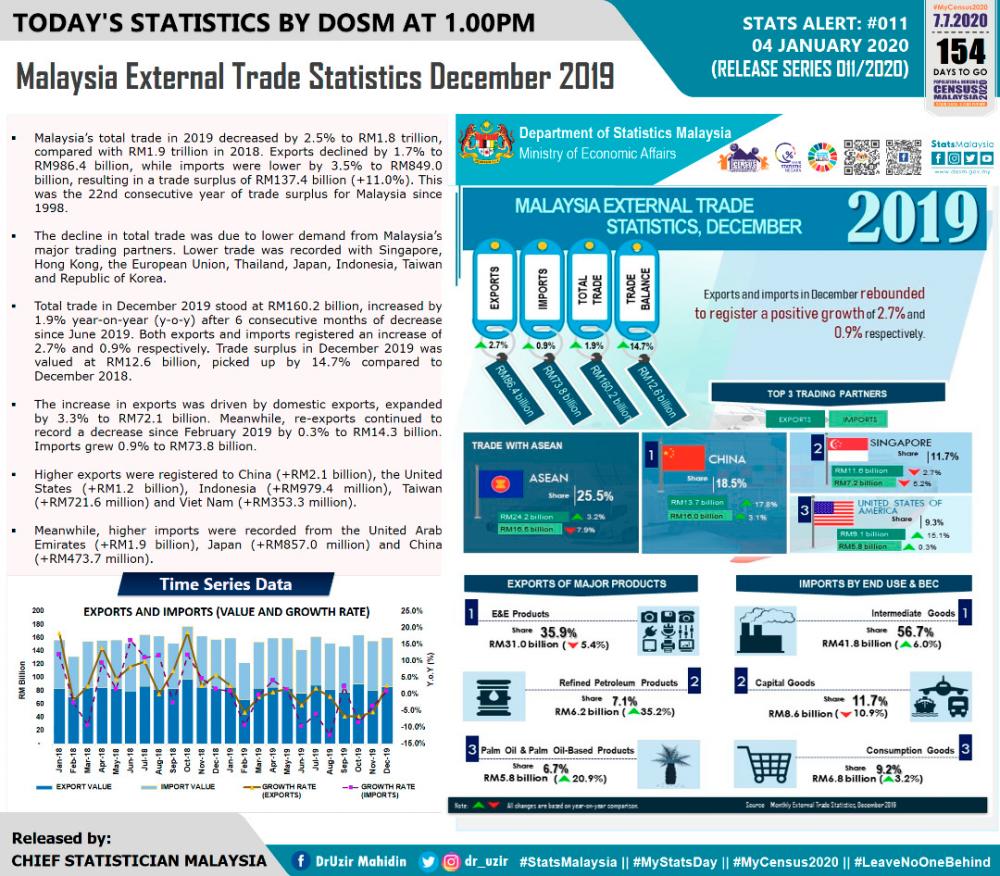PETALING JAYA: Malaysia recorded a trade surplus for 2019, marking the 22nd consecutive year of trade surplus for Malaysia since 1998, despite a 2.5% decline in total trade to RM1.8 trillion, compared with RM1.9 trillion in 2018.
In a statement, Department of Statistics chief statistician Datuk Seri Mohd Uzir Mahidin said exports declined by 1.7% to RM986.4 billion, while imports were lower by 3.5% to RM849 billion, resulting in a trade surplus of RM137.4 billion.
“The decline in total trade was due to lower demand from Malaysia’s major trading partners. Lower trade was recorded with Singapore, Hong Kong, the European Union, Thailand, Japan, Indonesia, Taiwan and Republic of Korea,” he said.
For Q419, total trade contracted by 3.6% to RM479.2 billion compared with RM497.3 billion in Q418.
Exports reached RM257.9 billion, 3.3% lower from the same period last year while imports contracted by 4% to RM221.4 billion.
Trade surplus in Q419, rose marginally by 0.6% to RM36.5 billion.
For December alone, total trade stood at RM160.2 billion, a year-on-year increase of 1.9% after 6 consecutive months of decrease since June 2019.
Both exports and imports registered an increase of 2.7% and 0.9% respectively.
Trade surplus in December 2019 was valued at RM12.6 billion, up by 14.7% compared to December 2018.
“The increase in exports was driven by domestic exports, expanded by 3.3% to RM72.1 billion. Meanwhile, re-exports continued to record a decrease since February 2019 by 0.3% to RM14.3 billion. Imports grew 0.9% to RM73.8 billion,” said Mohd Uzir
Higher exports were registered to China (RM2.1 billion), the United States (RM1.2 billion), Indonesia (RM979.4 million), Taiwan (RM721.6 million) and Vietnam (RM353.3 million).
Meanwhile, higher imports were recorded from the United Arab Emirates (RM1.9 billion), Japan (RM857 million) and China (RM473.7 million).
The main products which contributed to the growth in exports in December 2019 were refined petroleum products (RM1.6 billion), palm oil and palm oil-based products (RM1 billion), timber and timber-based products (RM180.9 million) and natural rubber (RM21.9 million).
However, decreases were recorded for electrical & electronic products (RM1.8 billion), liquefied natural gas (RM961.6 million) and crude petroleum (RM799.3 million).
Meanwhile, imports by end use recorded an increase for intermediate goods (RM2.4 billion) and consumption goods (RM212.1 million). Nevertheless, imports for capital goods decreased RM1.1 billion.













